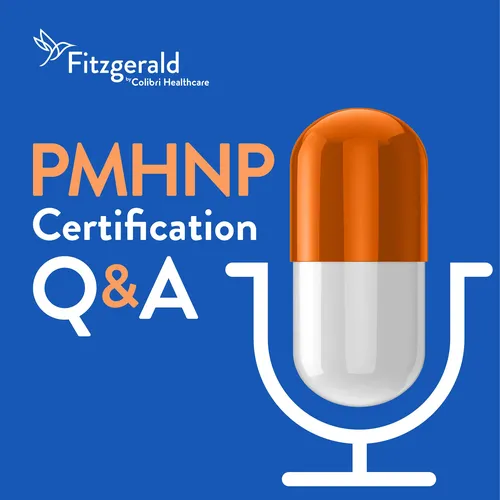
PMHNP Certification Q & A
This podcast is for NP students studying to pass their PMHNP certification exam. Expert Fitzgerald faculty clinicians share their knowledge and experience to help you dissect the anatomy of a test question so you can better understand how to arrive at the correct test answer.
- Update frequency
- every 7 days
- Average duration
- 6 minutes
- Episodes
- 85
- Years Active
- 2024 - 2025

Agitated Elderly Patient
The PMHNP on call gets a call from the assisted living facility to advise that his 78-year-old patient is acutely confused. The patient, who is treated with mirtazapine for anxiety, insomnia, and dec…

Bipolar Disorder Risk Factors
A 25-year-old female patient is being evaluated to rule out bipolar disorder. The PMHNP knows that all of the following are risk factors for bipolar disorder except:
A. A history of depressive disord…

Pharmacotherapy Option
A 29-year-old pregnant woman is referred to the PMHNP for management of anxiety and depression. She has been taking paroxetine 40 mg daily as an outpatient for several years prescribed by her primary…

Transtheoretical Model of Change
A 42-year-old male presents for treatment of opioid use disorder. He has been taking 30 mg oxycodone tablets 4-6 times a day for over a year and both his personal and professional life are deteriorat…

Suicide Assessment
Suicide assessment should include an assessment of both risk factors and protective factors. Which of the following is a true statement with respect to suicide assessment?
A. Each protective factor m…

Profound Anxiety In Teen
A 19-year-old male is in your office for evaluation of profound anxiety. He is in his first year of college and last week there was an active shooter on campus. Three people were killed. Although he …

Piaget's Developmental Stage
The PMHNP is asked to evaluate a 5-year-old child who has been having difficulty adjusting to kindergarten and has been disruptive in the classroom. The child is pleasant in the office, responds to q…

Mental Status Exam
While performing a mental status exam, the PMHNP asks the patient to count backwards, beginning with 100 and subtracting 7. This is an effort to assess which element of the mental status exam?
A. Con…

Difficult PMHNP interview
A new patient is being evaluated at the request of her primary care provider. While conducting the interview the PMHNP has a very difficult time getting direct answers to questions. The patient will …

Comparing Medicine
When counseling the parents of a 7-year-old patient regarding pharmacotherapy for attention deficit disorder, the PMHNP identifies which clinically relevant difference between clonidine and guanfacin…

ADD Tool
Which of the following is not a validated tool used to evaluate attention deficit disorder?
A. The Vanderbilt Assessment Scale
B. The Connors Comprehensive Scale
C. The Early Childhood Screening Asse…

Alzheimer's Treatment
Alzheimer’s disease is the most common cause of major neurocognitive disorder and and while largely managed with non-pharmacologic interventions, there are also a variety of pharmacotherapeutics avai…

Borderline Personality Characteristic
A new patient presents for evaluation of self-diagnosed bipolar disorder. An assessment of her history of interpersonal relationships increases your index of suspicion for borderline personality diso…

Medication Change
A 32-year-old female patient with diagnoses of bipolar I disorder and borderline personality disorder was recently transferred to your care. She was managed on desvenlafaxine ER 150 mg daily and olan…

Treatment Contraindications
You are evaluating a 71-year-old female patient and have made a diagnosis of major depressive episode, moderate. The patient is agreeable to pharmacotherapy. When considering pharmacologic treatment …

Piaget's
Piaget’s sensorimotor stage of development is characterized by all of the following except:
A. Object permanence
B. Magical thinking
C. Exploring
D. Manipulating environment
---
YouTube: https://www.you…

PTSD Medication Treatment
You are evaluating a 17-year-old patient who presents for care reporting panic attacks. A comprehensive assessment suggests that the patient is experiencing post-traumatic stress disorder related to …

OCD Pharm Options
A 14-year-old female is diagnosed with obsessive-compulsive disorder and has been in exposure and response prevention (ERP) therapy for the last three months. While there has been some improvement of…

Suspected Organism
Which of the following organisms are associated with an increased risk of neurodevelopmental disorders?
A. Group B Streptococcus
B. Escherichia coli
C. Herpes simplex virus
D. Proteus sp.
---
YouTube: h…

Evaluation Recommendation
The PMHNP is evaluating Jared, a 47-year-old male who is brought to care by his wife because “he’s not the man I married 20 years ago.” He denies any significant medical history. He takes no medicat…